October 2023
Peripheral Neuropathy and Its Impact on Feet
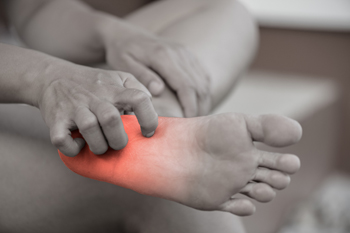
Peripheral neuropathy is a complex condition that affects the peripheral nervous system, leading to a range of symptoms that can significantly impact the feet. This disorder results from damage to the nerves outside the brain and spinal cord, often caused by various underlying conditions such as diabetes, infections, or autoimmune diseases. When it affects the feet, individuals may experience numbness, tingling, or a sensation of pins and needles. This can progress to sharp, shooting pain and muscle weakness. As the condition advances, it can lead to a loss of balance and coordination, increasing the risk of falls. The feet may also become more susceptible to injuries, blisters, and ulcers, with a reduced ability to detect pain or discomfort. Managing peripheral neuropathy often involves addressing the underlying cause, along with pain management and lifestyle adjustments. If you have symptoms of neuropathy, it is suggested that you schedule an appointment with a podiatrist who can perform routine foot exams which may help to prevent potential complications.
Neuropathy
Neuropathy can be a potentially serious condition, especially if it is left undiagnosed. If you have any concerns that you may be experiencing nerve loss in your feet, consult with Dr. Robert Marcus from Foot & Ankle Center of Teaneck. Our doctor will assess your condition and provide you with quality foot and ankle treatment for neuropathy.
What Is Neuropathy?
Neuropathy is a condition that leads to damage to the nerves in the body. Peripheral neuropathy, or neuropathy that affects your peripheral nervous system, usually occurs in the feet. Neuropathy can be triggered by a number of different causes. Such causes include diabetes, infections, cancers, disorders, and toxic substances.
Symptoms of Neuropathy Include:
- Numbness
- Sensation loss
- Prickling and tingling sensations
- Throbbing, freezing, burning pains
- Muscle weakness
Those with diabetes are at serious risk due to being unable to feel an ulcer on their feet. Diabetics usually also suffer from poor blood circulation. This can lead to the wound not healing, infections occurring, and the limb may have to be amputated.
Treatment
To treat neuropathy in the foot, podiatrists will first diagnose the cause of the neuropathy. Figuring out the underlying cause of the neuropathy will allow the podiatrist to prescribe the best treatment, whether it be caused by diabetes, toxic substance exposure, infection, etc. If the nerve has not died, then it’s possible that sensation may be able to return to the foot.
Pain medication may be issued for pain. Electrical nerve stimulation can be used to stimulate nerves. If the neuropathy is caused from pressure on the nerves, then surgery may be necessary.
If you have any questions, please feel free to contact our office located in Teaneck, NJ . We offer the newest diagnostic and treatment technologies for all your foot care needs.
Facts About Children's Feet
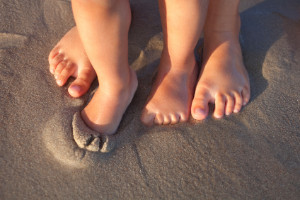
Children's feet are remarkable in their growth and development, undergoing significant changes from birth to adolescence. During infancy, a baby's feet are mostly cartilage, gradually ossifying into bones. It is fascinating to note that a child will typically grow approximately 17 shoe sizes by the age of two. As they start walking, the arches of their feet begin to form and develop, providing stability and support. Children often have a naturally wider forefoot and a flat arch due to the accumulation of fatty tissue, which eventually diminishes with age and activity. Wearing proper footwear when the time is right is important for healthy foot development, allowing room for growth and adequate support. Regular check-ups with a podiatrist can ensure any potential foot issues are addressed early. If you would like additional information about the stages of development in children’s feet, it is suggested that you confer with a podiatrist.
The health of a child’s feet is vital to their overall well-being. If you have any questions regarding foot health, contact Dr. Robert Marcus of Foot & Ankle Center of Teaneck. Our doctor can provide the care you need to keep you pain-free and on your feet.
Tips for Keeping Children's Feet Healthy
- Make sure their shoes fit properly
- Look for any signs of in-toeing or out-toeing
- Check to see if they have Clubfoot (condition that affects your child’s foot and ankle, twisting the heel and toes inward) which is one of the most common nonmajor birth defects.
- Lightly cover your baby’s feet (Tight covers may keep your baby from moving their feet freely, and could prevent normal development)
- Allow your toddler to go shoeless (Shoes can be restricting for a young child’s foot)
- Cut toenails straight across to avoid ingrown toenails
- Keep your child’s foot clean and dry
- Cover cuts and scrapes. Wash any scratches with soap and water and cover them with a bandage until they’ve healed.
If you have any questions, please feel free to contact our office located in Teaneck, NJ . We offer the newest diagnostic and treatment technologies for all your foot care needs.
Causes of Burning Feet After a Run
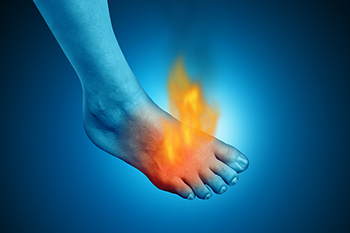
If you have ever experienced the uncomfortable sensation of burning feet after a run, you know how it can quickly put a damper on your exercise routine. The good news is that there are both immediate treatment options and preventive measures you can take to keep your feet cool and comfortable during and after your runs. Take a break after running and elevate your feet to reduce swelling and ease discomfort. Suggestions for preventing burning feet after running include selecting the right pair of shoes. Ensure they fit well, provide adequate arch support, and are designed for your specific activity. Keep your feet dry with moisture-wicking socks designed to pull sweat away from your skin. These socks are especially useful in hot weather or during intense exercise. Stretching your feet and legs before exercise can improve circulation and prevent burning sensations. If you continue to experience burning feet after running, it is suggested that you make an appointment with a podiatrist for helpful treatment and prevention tips.
Foot Pain
Foot pain can be extremely painful and debilitating. If you have a foot pain, consult with Dr. Robert Marcus from Foot & Ankle Center of Teaneck. Our doctor will assess your condition and provide you with quality foot and ankle treatment.
Causes
Foot pain is a very broad condition that could be caused by one or more ailments. The most common include:
- Bunions
- Hammertoes
- Plantar Fasciitis
- Bone Spurs
- Corns
- Tarsal Tunnel Syndrome
- Ingrown Toenails
- Arthritis (such as Gout, Rheumatoid, and Osteoarthritis)
- Flat Feet
- Injury (from stress fractures, broken toe, foot, ankle, Achilles tendon ruptures, and sprains)
- And more
Diagnosis
To figure out the cause of foot pain, podiatrists utilize several different methods. This can range from simple visual inspections and sensation tests to X-rays and MRI scans. Prior medical history, family medical history, and any recent physical traumatic events will all be taken into consideration for a proper diagnosis.
Treatment
Treatment depends upon the cause of the foot pain. Whether it is resting, staying off the foot, or having surgery; podiatrists have a number of treatment options available for foot pain.
If you have any questions, please feel free to contact our office located in Teaneck, NJ . We offer the newest diagnostic and treatment technologies for all your foot care needs.
Dealing With Swollen Feet While Pregnant
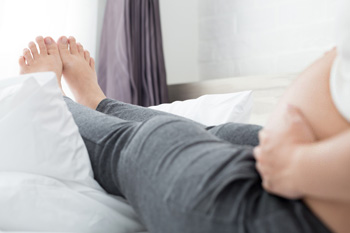
One discomfort that often accompanies pregnancy is swollen ankles, known as edema. Fortunately, there are several ways to minimize the problem. The key to managing swollen ankles during pregnancy is to defy gravity. Sit with your feet elevated to reduce pressure on the lower extremities. While seated, circle your ankles occasionally to encourage blood flow, and avoid standing for extended periods. Sleeping on your left side is believed to be beneficial for your baby and for your circulation. This position alleviates pressure on the inferior vena cava, helping to reduce ankle swelling. Elevating your legs at a gentle angle with pillows can further promote healthy blood flow. Consider investing in compression stockings to prevent blood from pooling in your ankles. Incorporate daily gentle exercises into your routine, such as swimming and walking. These activities help keep your blood flowing optimally, reducing the risk of swollen ankles. If you have concerns about swollen ankles or any other foot-related issues during pregnancy, it is suggested that you consult a podiatrist for an evaluation and recommended treatment options.
Pregnant women with swollen feet can be treated with a variety of different methods that are readily available. For more information about other cures for swollen feet during pregnancy, consult with Dr. Robert Marcus from Foot & Ankle Center of Teaneck. Our doctor will attend to all of your foot and ankle needs.
What Foot Problems Can Arise During Pregnancy?
One problem that can occur is overpronation, which occurs when the arch of the foot flattens and tends to roll inward. This can cause pain and discomfort in your heels while you’re walking or even just standing up, trying to support your baby.
Another problem is edema, or swelling in the extremities. This often affects the feet during pregnancy but tends to occur in the later stages.
How Can I Keep My Feet Healthy During Pregnancy?
- Wearing orthotics can provide extra support for the feet and help distribute weight evenly
- Minimize the amount of time spent walking barefoot
- Wear shoes with good arch support
- Wear shoes that allow for good circulation to the feet
- Elevate feet if you experience swelling
- Massage your feet
- Get regular, light exercise, such as walking, to promote blood circulation to the feet
If you have any questions please feel free to contact our office located in Teaneck, NJ . We offer the newest diagnostic and treatment technologies for all your foot and ankle needs.
Baxter’s Neuritis
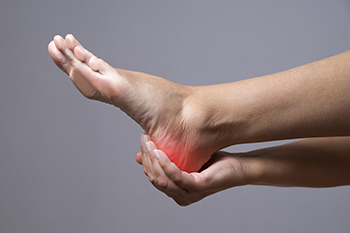
Baxter's nerve entrapment, or Baxter’s neuritis, is a condition where a small nerve, known as the Baxter's nerve or the first branch of the lateral plantar nerve, becomes pinched between two muscles in the inner foot. This can result in sharp, burning pain in the inner heel, often accompanied by numbness, or a pins and needles sensation. It can develop gradually without a specific injury and is not limited by age or gender. It can be challenging to differentiate between Baxter's nerve entrapment and plantar fasciitis because they have similar symptoms. Diagnosis involves a clinical interview, physical testing, and a diagnostic ultrasound scan to confirm the presence of Baxter's nerve entrapment. Treatment typically begins with conservative approaches, including pain management, strengthening exercises, stretches, and orthotics. If conservative treatment does not work, ultrasound guided steroid injections may be considered to reduce inflammation. It is beneficial that these injections are used in conjunction with conservative care to prevent the pain from returning. If you have heel pain, it is suggested that you make an appointment with a podiatrist for a proper diagnosis and treatment.
Many people suffer from bouts of heel pain. For more information, contact Dr. Robert Marcus of Foot & Ankle Center of Teaneck. Our doctor can provide the care you need to keep you pain-free and on your feet.
Causes of Heel Pain
Heel pain is often associated with plantar fasciitis. The plantar fascia is a band of tissues that extends along the bottom of the foot. A rip or tear in this ligament can cause inflammation of the tissue.
Achilles tendonitis is another cause of heel pain. Inflammation of the Achilles tendon will cause pain from fractures and muscle tearing. Lack of flexibility is also another symptom.
Heel spurs are another cause of pain. When the tissues of the plantar fascia undergo a great deal of stress, it can lead to ligament separation from the heel bone, causing heel spurs.
Why Might Heel Pain Occur?
- Wearing ill-fitting shoes
- Wearing non-supportive shoes
- Weight change
- Excessive running
Treatments
Heel pain should be treated as soon as possible for immediate results. Keeping your feet in a stress-free environment will help. If you suffer from Achilles tendonitis or plantar fasciitis, applying ice will reduce the swelling. Stretching before an exercise like running will help the muscles. Using all these tips will help make heel pain a condition of the past.
If you have any questions please contact our office located in Teaneck, NJ . We offer the newest diagnostic and treatment technologies for all your foot and ankle needs.






